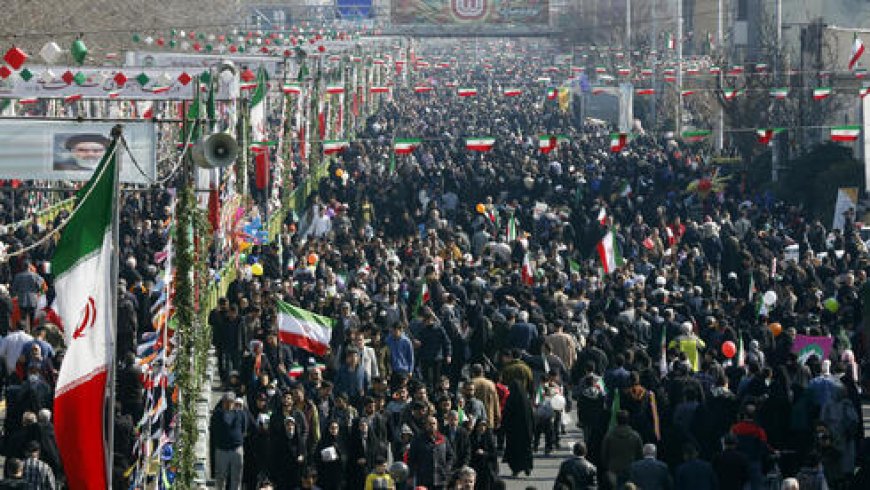46th Anniversary of the Islamic Revolution and the Unease of America and Israel
Tomorrow, on February 10, Iran will celebrate the 46th anniversary of the Islamic Revolution with great fervor and reverence. This day marks the fall of Shah Mohammad Reza Pahlavi's regime in 1979 and the establishment of the Islamic Republic under the leadership of Ayatollah Ruhollah Khomeini. Various ceremonies and rallies have been organized across Iran, with millions of citizens from all provinces and cities taking to the streets to participate.

Tomorrow, on February 10, Iran will celebrate the 46th anniversary of the Islamic Revolution with great fervor and reverence. This day marks the fall of Shah Mohammad Reza Pahlavi's regime in 1979 and the establishment of the Islamic Republic under the leadership of Ayatollah Ruhollah Khomeini. Various ceremonies and rallies have been organized across Iran, with millions of citizens from all provinces and cities taking to the streets to participate.
Significance of the Islamic Revolution
The revolutionary change led by the late Ayatollah Khomeini on February 10, 1979, not only transformed Iran's political landscape but also marked a historic turning point that impacted the entire Middle East. The revolution turned Iran from a secular monarchy into an Islamic Republic, where governance was based on religious principles. Ayatollah Khomeini's ideals and ideology introduced a new way of thinking, not just in Iran but also in other countries, which continues to influence many people and nations today.
Celebrations and Festivities
On the 46th anniversary, large-scale events will be held across the country. Rallies in Tehran and other major cities will demonstrate the people's loyalty to the nation and their support for the success of the Islamic Revolution. Senior government officials, religious leaders, and President Masoud Pezeshkian will also take to the streets to highlight the importance of this day.
The people of Iran celebrate this day as a monumental historical event and reaffirm their commitment to the stability and strength of the Islamic Republic. The atmosphere is filled with Iranian flags and images, adding to the enthusiasm. The Islamic Revolution not only influenced Iran but also had a profound impact on global politics and relations with Western countries.
After the revolution, Iran shifted its foreign policy, distancing itself from the United States and other Western nations while strengthening ties with its neighbors. Even today, this day is marked with special respect and pride in the country, symbolizing national unity for Iranian citizens.
The celebrations on the 46th anniversary of the Islamic Revolution demonstrate Iran's commitment to its revolution and religious leadership. This day is not only a source of pride for Iranians but is also seen globally as a symbol of Islamic ideology and independence. On this day, the Iranian people take to the streets to express their support for the Islamic Republic of Iran and Supreme Leader Ayatollah Khamenei.
These rallies are not limited to men; women, children, students, and prominent religious leaders also participate. This unique Independence Day, celebrated worldwide, stands out because it is the common people who take to the streets to celebrate. The Iranian public uses this day to debunk the "propaganda" spread by European countries claiming that the Iranian people are dissatisfied with the Islamic government.
Another distinctive feature of these celebrations is the anti-American and anti-Israeli slogans. Chants of "Death to America" and "Death to Israel" resonate throughout Iran. The Iranian people also rally in support of a "Free Palestine," protesting against Israeli atrocities. On this occasion, the popular slogan in support of Supreme Leader Ayatollah Khamenei, "The hand of God is over us, Khamenei is our leader," energizes the crowd.
Background and Causes
By the mid-1970s, Shah Reza Pahlavi's rule in Iran had become highly controversial and unstable. The Shah, in collaboration with Western powers, implemented several social and political reforms in the name of modernity and progress. However, these reforms led to widespread discontent and opposition among the general public. During the Shah's reign, secularism, economic inequality, corruption, and anti-imperialist sentiments grew.
Additionally, the Shah's rule weakened Islamic traditions and culture in Iran, which was unacceptable to religious leaders and the public. Ayatollah Ruhollah Khomeini, a prominent critic of the Shah's regime, advocated for Islamic governance and opposed the Shah's reforms. Khomeini was exiled by the Shah in 1964 but continued to spread revolutionary ideas from abroad, leading a religiously inspired movement.
Establishment of the Islamic Republic
After February 11, 1979, Ayatollah Khomeini declared the establishment of the Islamic Republic. This new political system aimed to implement Sharia law, give religious leaders a central role, and create an independent state free from Western influence. Under Khomeini's leadership, Iran adopted a new constitution that placed religious authority at the highest level. According to this constitution, the Ayatollah was declared the Supreme Leader, and all government decisions had to comply with religious laws and Sharia.
Khomeini's Return
On February 11, 1979, when the Shah's loyalists and government officials attempted to regain control in Tehran, revolutionary forces completely overthrew the Shah's regime. This day is celebrated in Iran as the victory of the Islamic Revolution.
Khomeini had returned to Iran from exile in Paris on February 1, 1979, and was greeted by a massive public reception. On February 11, as the Shah's supporters tried to retain power, revolutionaries seized key government buildings and ended the Shah's rule.
Global Impact of the Islamic Revolution
The Islamic Revolution in Iran was not only a historic turning point for Iran but also had a profound impact on the entire Middle East and the Islamic world. Iran's example inspired other Islamic countries to establish Islamic values in their governance. The revolution also alarmed Western nations, particularly the United States, as Iran had now become a fully Islamic state.













































